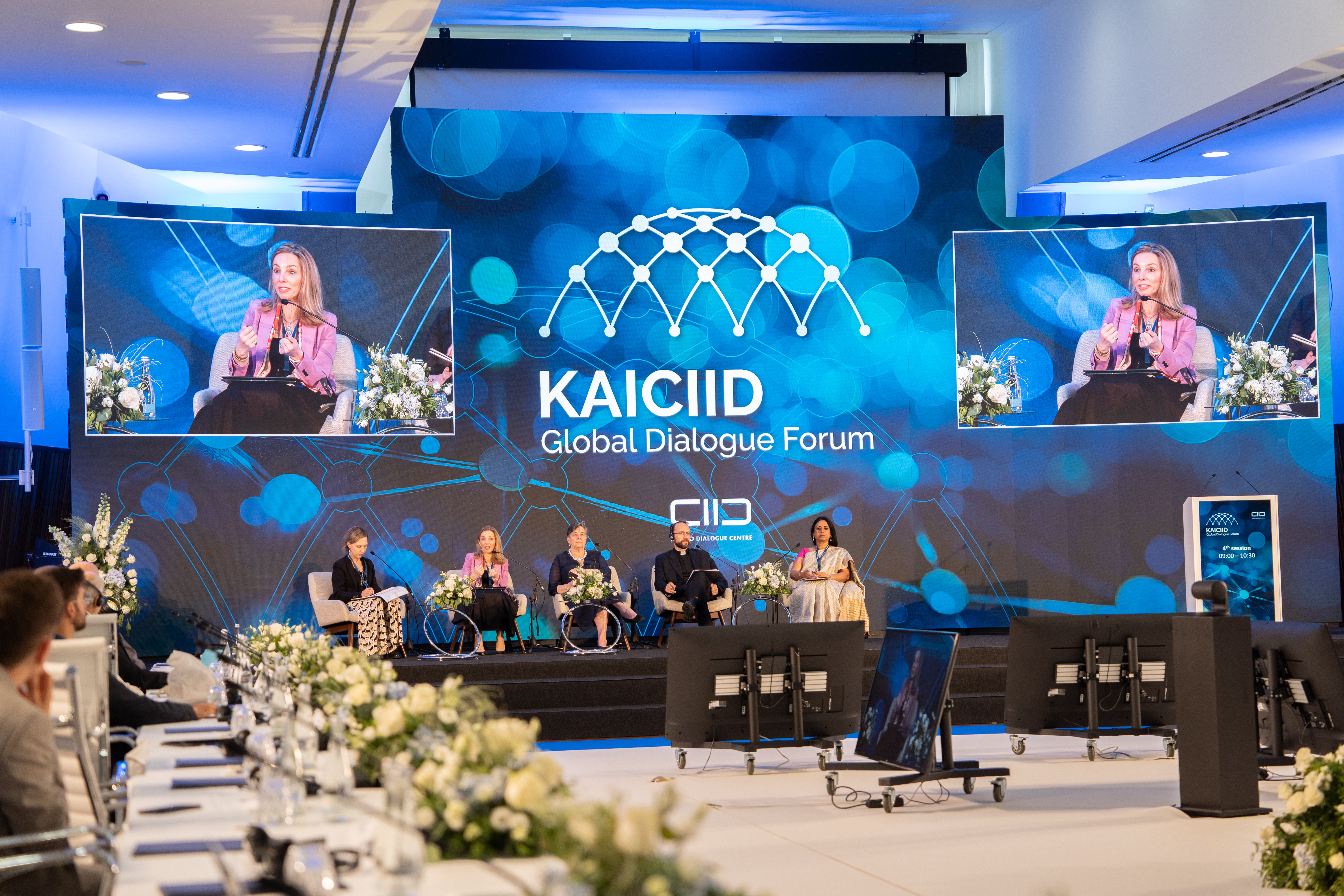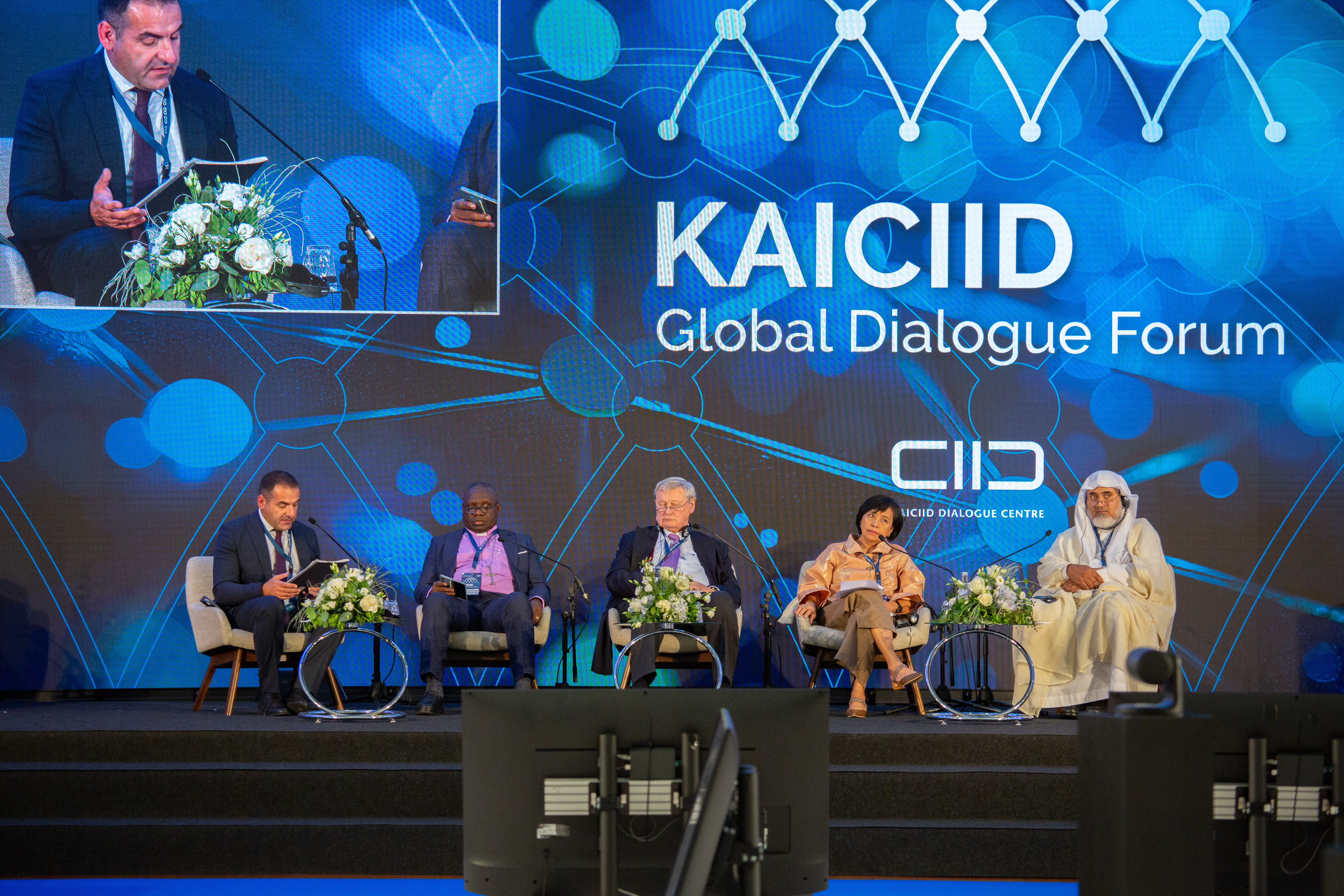
As the KAICIID Global Dialogue Forum entered its second day, participants delved deeper into pressing issues of peacebuilding and the creation of inclusive cities.
The Urbanization Challenge
Participants were made aware of the fact that the world is undergoing the largest wave of urbanization in history. More than half of the world’s population now lives in towns and cities, and by 2030, this number is expected to rise to 5 billion people.
Teresa Albano, Senior Programme Manager at KAICIID, stated, “Although urbanization has the potential to usher in a new era of well-being, cities are also the home of high concentrations of poverty. Inclusive cities are characterized by policies and programs that better support underserved populations.”
Closing the Gender Gap
Mónica Ferro, Director of the United Nations Population Fund (UNFPA) Office in London, highlighted that underserved populations include women, noting that studies show it will take 200 years to close the gender gap. She added that high concentrations of inequality challenge both national and local governments.
“Affordable childcare, healthcare, education, and housing are essential for supporting women’s economic independence and well-being,” Ferro said. She also advocated for policies that support women in the workforce. “The glass ceiling is affordable childcare.”
Ferro praised cities like Vienna, Barcelona, and Glasgow for their efforts in inclusive city planning. “It’s quite simple: build safe public spaces. Make sure that the streets are well-lit and that there are secure transit options,” she said. She also stressed the importance of using population data to inform policies, ensuring that cities effectively serve their residents.
Including the Poor and Vulnerable
Panelists emphasized that it’s not just women but also the poor and vulnerable who have traditionally been left out of urban planning. “We must acknowledge that the world is at its most unequal tipping point today,” said Kezevino Aram, former KAICIID Board Member. She highlighted that temperature changes reflect stark inequalities, using the example of a recent heatwave in India.
Aram called for reshaping public services with a focus on upholding fundamental religious values, including the recognition of human dignity. “In terms of structural design,” she suggested, advocating for city planning that ensures a more equitable living environment for all.
Father Laurent Basanese S.J. from the Dicastery for Interreligious Dialogue echoed Aram’s sentiments, criticizing the practice of marginalizing the poor during major events like the Olympic Games, where they are often pushed out of sight or relocated to the city’s edges. “What kind of civilization do we want to be if we choose projects that exclude the poor?” he questioned.
Basanese stressed that the inclusion of the poor should be a fundamental criterion for evaluating urban planning projects. “It will be terrible for us, for our cities, for our societies if we forget the poor and those living in isolation,” he warned.
Katherine Marshall, Vice President of the G20 Interfaith Association, noted that despite the tremendous benefits from diversity in cities, it can be very difficult for policymakers to manage. “People may not perceive that the diversity of their city is really to their advantage,” she noted. This perception is compounded by the influx of refugees and migrants, which has raised fear and tension globally, even though studies show most refugees are internally displaced within their own countries. “In the United States, there are surveys that show that the people who express the most anxiety about migrants and refugees live in places where there are almost no migrants,” she said. The solution, according to Marshall, is improved education.
The Impact of Grassroots Dialogue in Peacekeeping

Panels on peacekeeping drew attention to critical global conflicts, including those in the Sahel, across Asia-Pacific, and in Ukraine and Gaza.
Archbishop Daniel Okoh, a member of the KAICIID-supported Interfaith Dialogue Forum for Peace (IDFP) in Nigeria, noted that peacebuilding in his country has required significant perseverance. Since Nigeria's independence, the country has grappled with fierce religious and ethnic conflicts.
“The diversity of Nigeria, which should be our strength and pride, has been misused by crisis merchants for their selfish gains to maintain economic and political domination,” Archbishop Okoh said. He highlighted the necessity of religious leaders working with military leaders and government officials. “The military high command realized that a kinetic approach to violence will not solve the problem; we need the collaboration of religious leaders.”
Informal relationships and discussions have proven to be just as important as formal dialogues in peacebuilding efforts. Archbishop Okoh pointed out that religious leaders play a crucial role in educating the public about the military's peacebuilding efforts and helping the military receive feedback from the community. “We, as religious leaders, are closer to the people at the grassroots,” he emphasized.
The importance of interreligious dialogue in Nigeria has proven paramount, given the country’s 271 ethnic groups and over 500 languages. Archbishop Okoh shared that the IDFP has created a manual and interfaith code of conduct to aid in the peace process.
Alissa Wahid, National Director of the Gusdurian Network Indonesia (GNI), noted that Indonesia has also stepped up its efforts to build religious harmony. However, she said that since 2005, there has been an increase in intolerance and discrimination, causing tension at grassroots levels. "Religious exclusivism and superiority due to majoritarianism are leading to intolerance and discrimination,” she said.
According to Wahid, state actors often prioritize social harmony and conflict prevention but may neglect fulfilling constitutional rights to freedom of religion and belief. This has led to the rise of ultra-conservative Islamic groups and an increase in related incidents. The challenge is exacerbated by Indonesia’s large geographical size and population.
However, Wahid continued, a comprehensive strategy with a systems-thinking approach has proven successful. In 2019, the Ministry of Religious Affairs initiated a strategy to strengthen religious moderation, including training for police and law enforcement and reforms in higher education. This approach identifies critical points to address religious freedom effectively. Wahid shared that a 2023 survey showed high public satisfaction with the government’s performance in fostering respect, diversity, and religious harmony, with a notable decrease in intolerance and hate speech incidents.
“It’s about what kind of religiosity we want to foster,” Wahid said. “It should be based on human dignity and founded on the principles of justice and moderation.”
---